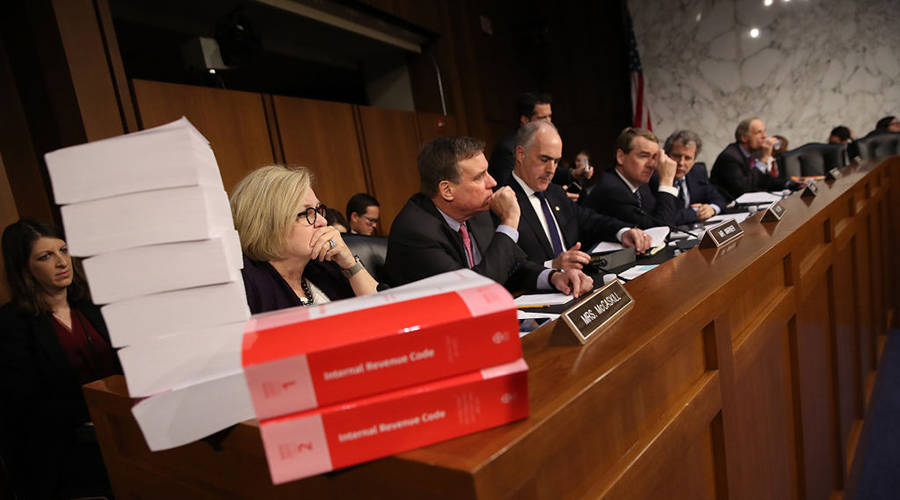

Senate Republicans are working on a tax bill, and today Kentucky Sen. Rand Paul formally proposed an amendment that would get rid of the Affordable Care Act’s individual health insurance mandate. Sarah Kliff is the senior policy correspondent at Vox and the host of the new podcast “The Impact.” Marketplace host Kai Ryssdal called her up to do a little tax bill unpacking. The following is an edited transcript of their conversation.
Kai Ryssdal: So help me understand, assuming this thing passes, how this would work. The individual mandate goes away, and then what?
Sarah Kliff: Then lot of people lose health insurance. So what we know about individual mandate repeal is that it would cause about 13 million fewer people to have insurance, that’s according to the Congressional Budget Office analysis. And this happens because you essentially see the healthy people drop out of the marketplace. When they are not required to buy insurance, they might decide, “You know what, I’m going to risk it. I’m not going to contribute.” And that would lead to some pretty significant insurance loss.
Ryssdal: And then rates, one assumes, for the not-healthy people staying on insurance, they go up, right?
Kliff: Exactly. So a lot of people expect you’d see something called a death spiral; with the healthy people exiting, the rates go up and up. We’ve actually seen a few states try to do health reform without a mandate, Washington state in the 1990s comes to mind. They had a death spiral happen, and they had no insurance companies willing to sell coverage to individuals by the end of that experiment. We know that it doesn’t work very well.
Ryssdal: What happens to Medicaid, which is a huge part of this entire operation?
Kliff: So this is a bit interesting and surprising. CBO estimates that 5 million people will lose Medicaid if the mandate were repealed. They think that people would be less inclined to sign up for Medicaid if there was no requirement to carry health insurance. Now, Republicans have disputed this number. They think it doesn’t make sense that people won’t enroll in Medicaid, a free program, because the mandate goes away. And this is one of the reasons the CBO is actually revisiting their analysis of the individual mandate right now.
Ryssdal: Is it fair for me to go back to some of our coverage of the health care bill in which I said, “You know what, the health care bill, it’s actually a tax bill.” Is that panning out now? Is that really what we’re seeing?
Kliff: Yeah, it feels like deja vu. The two are very closely intertwined. I think one of the reasons you see the individual mandate coming up right now is that it raises a lot of revenue for the tax cuts that Republicans want to pursue. CBO estimates it would save the federal government $338 billion over the next 10 years if they repeal the mandate. Most of that comes from people losing insurance. When fewer people have insurance there’s less money the government has to spend on subsidies.
Ryssdal: And then the government can use that money and put it toward other lower taxes for people and companies, it has to be said.
Kliff: Exactly. So it all really works together. Tax reform, health reform, they are not quite separate here in Washington. They seem to always be intertwined.
Ryssdal: It’s a tax bill. It’s a health care bill. Anyway, there is a “we’ve seen this movie before” thing going on here, right? Because we’re waiting on Sen. McCain, Sen. Murkowski, and Sen. Collins, all three of whom voted no on the original health care bill, to weigh in on this thing. And there’s no sign that they’re swayed one way or the other.
Kliff: Yeah, it’s been a pretty confusing afternoon on Capitol Hill. You have some leadership Republicans like John Thune saying, “We have the votes. We have 50 votes to pass this.” And then you have senators like Orrin Hatch, who chairs the Finance Committee that tax reform will run through, saying he doesn’t want to revisit the individual mandate. We’ll see some votes likely later this week, next week, the week after Thanksgiving. So it is definitely more likely that the Senate bill will include this. But as you guys have covered on this show, what happens in the Senate bill might not be the final word. We’re also getting rumblings from the House. They’re not excited to revisit the individual mandate.
[“Source-marketplace”]




